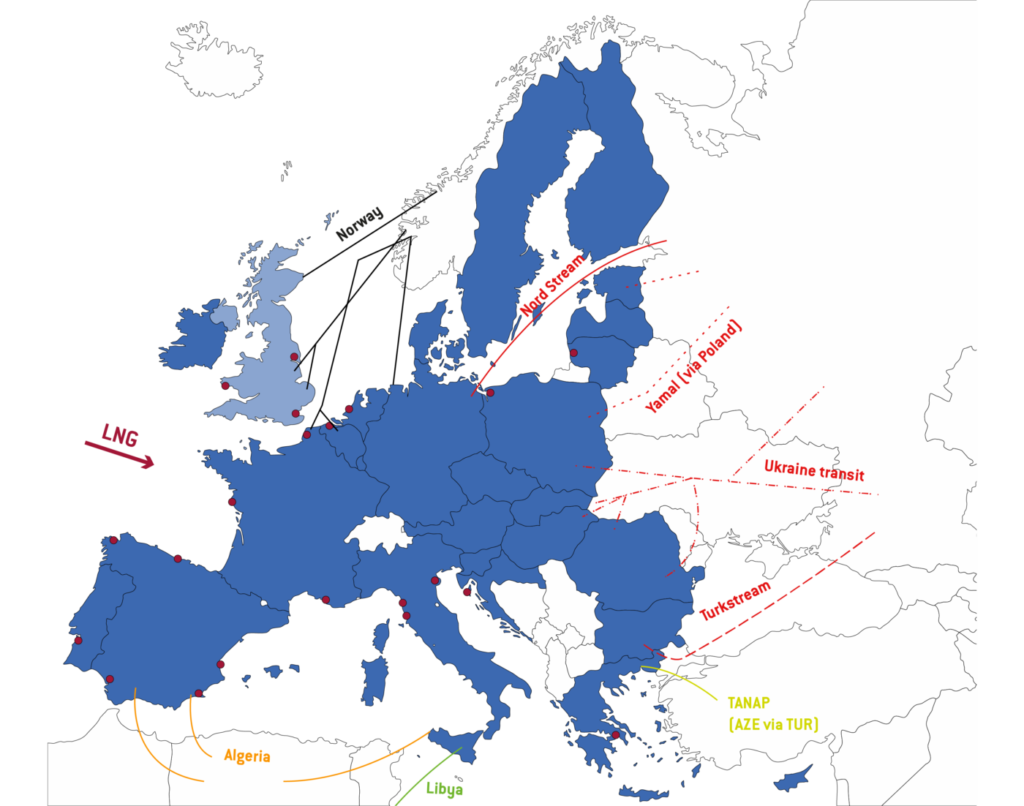A pipeline of natural gas from Russia to the West is also, in effect, a pipeline of money from the West to Russia. Neither side can cut off supplies to the other side without cutting itself off.
It’s a co-dependent relationship that has helped to keep to peace for decades. Pipeline politics has been especially helpful to the countries between Russia and Germany — and, in particular, Poland and Ukraine.
A briefing from the Bruegel institute includes a map showing how key pipeline routes cross Polish and Ukrainian territory. In the absence of alternative routes, Russia wouldn’t be able to invade either country without running the risk of losing vital energy export infrastructure. This is especially important for Ukraine, which lacks the protection of NATO membership.

However, Germany has undermined this strategic protection by cooperating with Russia to build the Nord Stream pipeline, which runs via the Baltic Sea thus bypassing Russia’s immediate neighbours. It was completed in 2011. More recently — and despite Russia’s growing aggression toward Ukraine, including the annexation of Crimea — a second pipeline (Nord Stream 2) has been built following the same route.
Germany has persisted in this policy despite dire warnings from the Poles and Ukrainians. America was also staunchly opposed — or at least it was until the Biden administration threw in the towel (a hallmark of its foreign policy).
It is therefore now possible for Russia to turn the whole of Ukraine into a war zone while keeping the gas flowing to the EU (and the EU’s money flowing back the other way). By the same token, Russia can more easily cut-off energy supplies to and via Ukraine.
With Russian troops massing on Ukraine’s borders, the nightmare scenario is coming true. Russia is taking full advantage of the strategic position that Nord Stream — and Germany — has given it. Anger against Berlin is building. Pressed on whether sanctions might be applied against the Nord Stream 2 pipeline, the German Chancellor Olaf Scholz said “all this will have to be discussed”. That’s too little too late. If there is an invasion then it isn’t just Russia that must held accountable.
The Germans might say that they were simply looking after their own interests. But that’s not good enough. The nations of the free world have benefited from the fact that, in matters of security, they’ve looked after one another’s interests.
Germany has not made a fair contribution to the West’s collective shield. Even worse, it has used its wealth to recklessly compromise its neighbours’ security. So in return, the German government should be presented with a bill for the full cost of its defence through NATO and the wider Pax Americana.
Of course, the Germans could refuse to pay. In which case they should have to provide their own security. Or, perhaps, they could ask their Russian friends instead?










Join the discussion
Join like minded readers that support our journalism by becoming a paid subscriber
To join the discussion in the comments, become a paid subscriber.
Join like minded readers that support our journalism, read unlimited articles and enjoy other subscriber-only benefits.
Subscribe